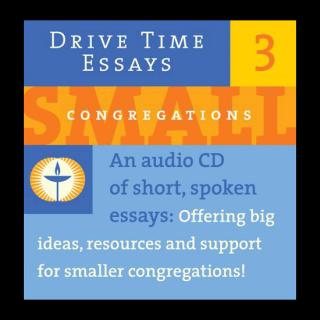Supportive Relationships Are Not Enough: A Drive Time Essay

Drive Time Essays Volume 3: Small Congregations
Learn More
As I work with congregations, I often hear people say that congregations are about relationships. I agree with that statement: relationships are the business of religion. Religion has to do with that which connects, or that which binds us together at the deepest and most profound levels.
What I don’t agree with is this statement that I sometimes hear: “All we have to do is support one another and the congregation will be fine.” Supporting one another is important, but if that is primarily what you do, then your congregation will decline. For a congregation to be alive, vital, and growing, it must not only be supportive of personal relationships, but it must also have a focus beyond itself. It must have a sense that it exists to serve as well as support.
One of the most significant movements within Unitarian Universalism in the past several decades has been the small-group ministry program that has been developed in many of our congregations. This program is grounded on the belief that our needs for intimacy and ultimacy can be powerfully enhanced in small-group ministries. But in addition to intimacy and ultimacy, the small-group movement has also called for efficacy—which is the urge and commitment to positively affect the larger world. Many small-group ministries have ignored this factor and have either died or been significantly weakened. An individual, group, or congregation needs a focus outside of itself in order to be healthy.
In the nineteenth century, many of our congregations started women’s groups. They were created to support one another, but also to gather resources of time, money, and talent to make a difference in the larger church and in society. These women’s groups often lasted longer than 100 years. Changing times have caused women’s groups to fade and in their place came other support groups that were important, but rarely lasted even 10 years. Why? Because their identity was often not grounded in a mission beyond themselves.
Research into congregational growth shows that congregations that describe themselves as families are likely to be on a decline. The family patterns, when applied to religious communities, lead to stagnation and eventually deterioration. Our congregations need more than family and supportive relationships if they are to thrive.
So, if your congregation has leveled off or is dwindling, it may be that you are focusing on only one part that makes us a whole. Support needs service just as love needs justice. One without the other eventually leads to stagnation, and stagnation eventually leads to diminishment and decline.
There is no substitute for looking beyond ourselves—transcending our boundaries for the sake of something larger. No matter what our history or size, our congregations are called to transform life in a way that is consistent with our values. This means reaching out, opening up, and giving of ourselves. And in so doing, we—and our congregations—are renewed and enlivened.
About this Essay
Audio Essay Series: Volume 3: Small Congregations, Track 11 (MP3, 3:52 minutes)
Author: The Reverend Doctor Tom Chulak, Acting District Executive for the Ohio Meadville District
About the Drive Time Essay Series
This Audio Essay series was created by the Unitarian Universalist Association of Congregations, for the purpose of supporting its valued lay leaders. Copying and sharing these essay texts, downloadable audio files, and the companion Lay Leader Drive Time Essays compact disc is welcomed and encouraged.